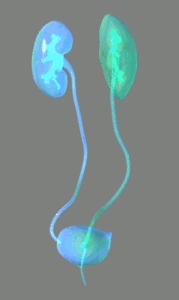 When mineral salts in the urine becomes saturated, they may turn into kidney stones. Their composition is mostly calcium, but may also have cysteine or uric acid. The most common ones are oxalate and calcium phosphate, which, when present, will mean that salts have been removed from the bone matrix due to increased acidity. What is used to detect renal stone formation is the urinary pH.
When mineral salts in the urine becomes saturated, they may turn into kidney stones. Their composition is mostly calcium, but may also have cysteine or uric acid. The most common ones are oxalate and calcium phosphate, which, when present, will mean that salts have been removed from the bone matrix due to increased acidity. What is used to detect renal stone formation is the urinary pH.
Alkaline minerals are used to prevent calcium stones from building up. Potassium citrate is one example. When there’s acidosis, it means that the urinary citrate concentration is low. Citrate reduces the free circulating calcium inside the body. This, in turn, decreases the chances of crystallisation and enlargement in kidney stone calcium.
It has also been proven that calcium stone sufferers also suffer from magnesium and potassium deficiency. Supplementation of these two minerals has been found to greatly reduce the presence of calcium salt concretions, versus supplementing solely with potassium.
With a pH of 5.5 and below, uric acid is insoluble. When this happens, saturation levels peak and the acid crystalises – becoming kidney stones, or worse, gout. Gout is the crystallisation of uric acid around the joints. When uric acid in the blood is high, there’s a great chance that the patient will also suffer hypertension, renal disease, or cardiovascular disease.
In order to reverse all of this, urine must be alkaline. The more alkaline the pH is, the more soluble is the uric acid, improving the excretion by the kidneys. Oral purines, which are rich in sulphur containing amino acids, are acidic, and will reduce pH in urine, increasing the concentration of uric acid.
Prunus cerasus, or sour cherry, has been shown to help lower uric acid levels. By reducing these levels, and increasing cellular pH, the risk of undesirable side effects is subsequently decreased. Its constituents are also capable of inhibiting the breakdown of collagen when there is inflammation, further proving that it is advisable to patients with gout and rheumatoid arthritis problems.
When taken as supplements, citrates can increase urine pH through the accumulation of bicarbonate in the urine, and can decompose uric acid crystals, improving excretion. Defenses against renal epithelial cell damage are also enhanced by calcium oxalate crystallisation.
Questions? Feel free to get in touch.
More on the body’s pH:
pH And Health (Part 1 of 4): Upsetting the Balance
pH And Optimal Health (Part 2 of 4): Skeletal System
pH And Health (Part 4 of 4): Alkaline and Acid Foods Supplement Essentials
